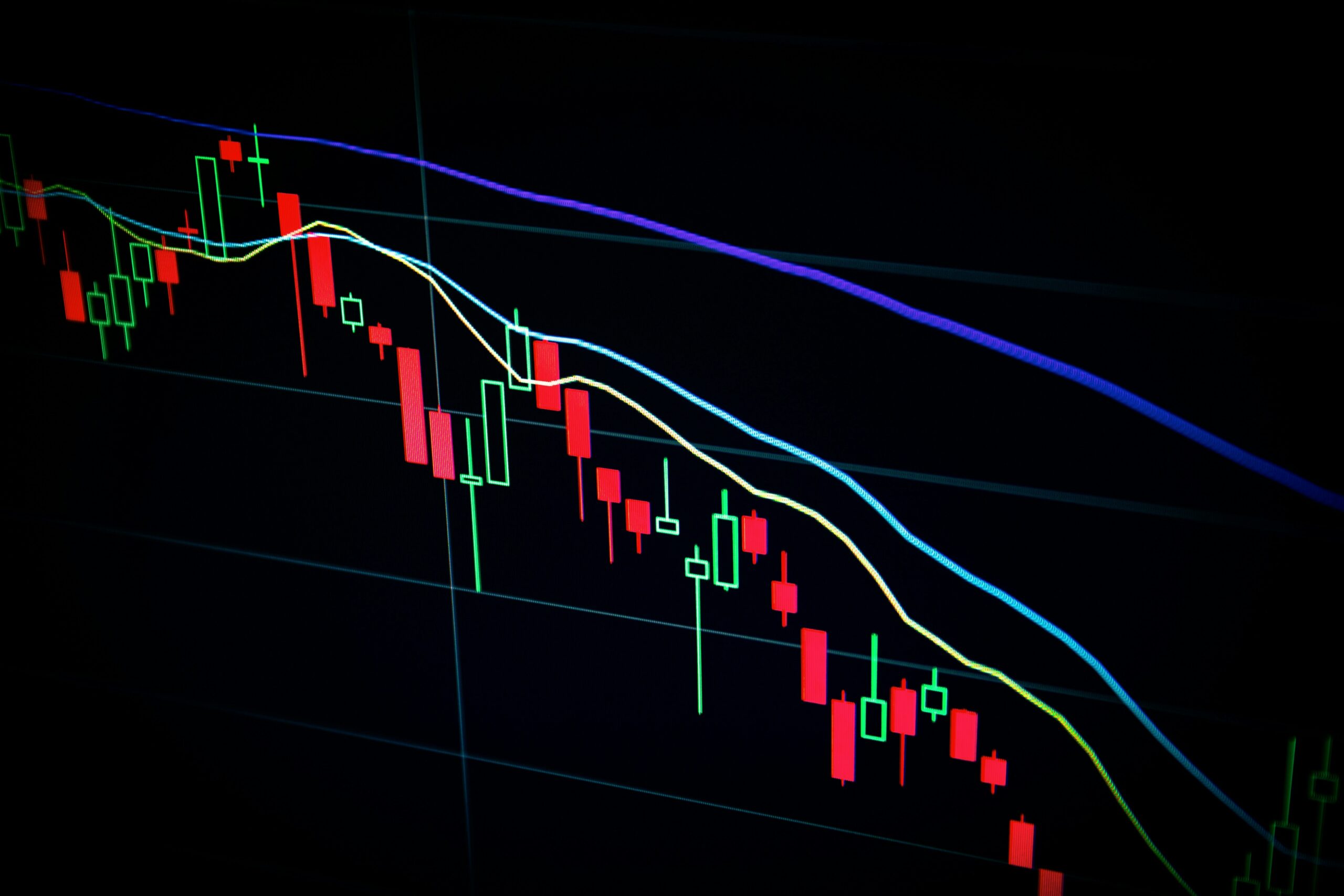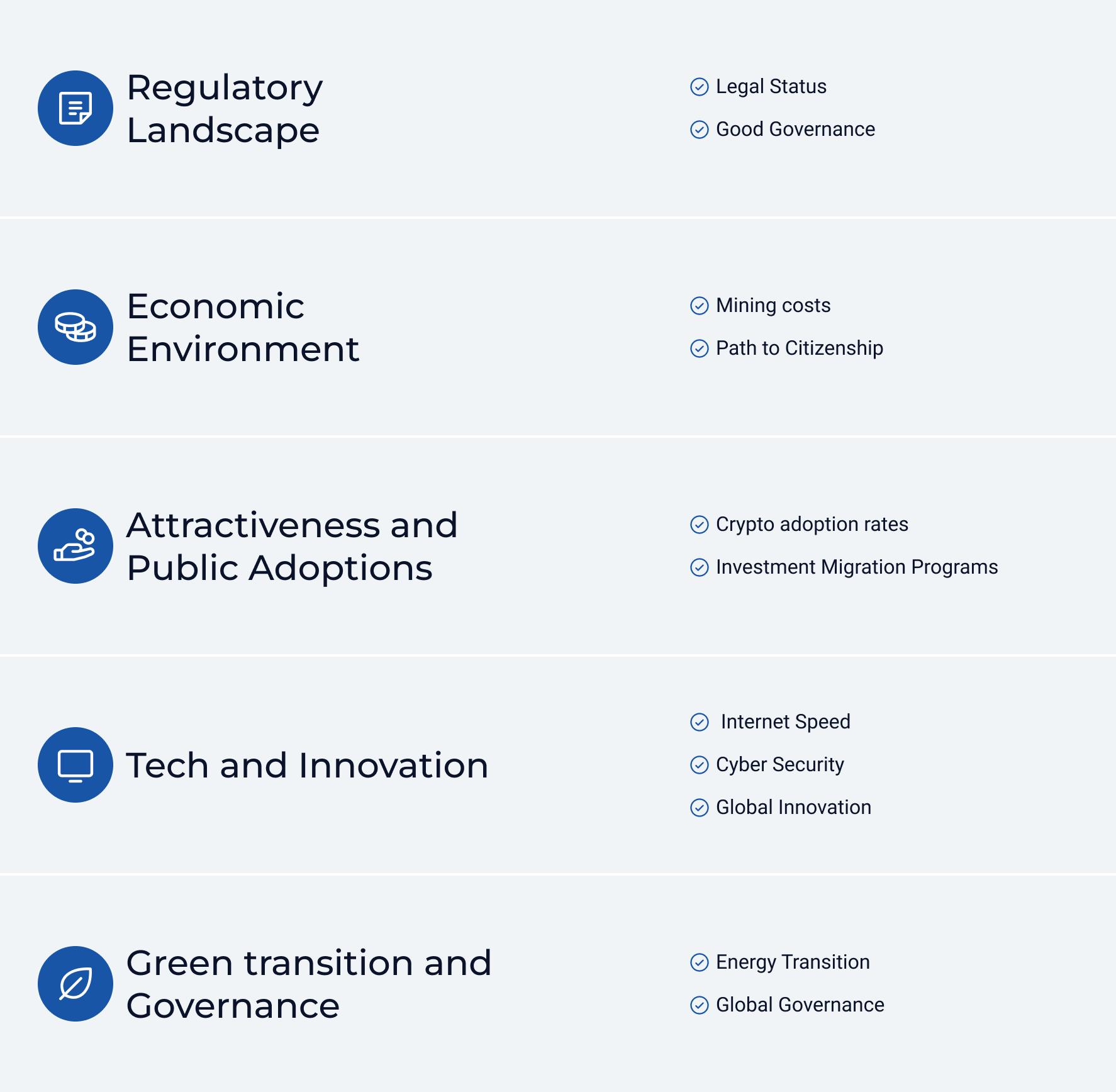Cryptocurrency Report: Methodology

Table of Contents
Introduction
The Global Crypto Friendly Countries Index is composed of 13 target-oriented indicators grouped into 5 thematic sub-indices, according to the chart below.

Data was meticulously sourced from highly regarded indices, including the 2023 Crypto Adoption Index from Chain Analysis, the National Cyber Security Index, the Energy Transition Index from the World Economic Forum, the Cost to Mine Bitcoin from Visual Capitalist, and the Chandler Economic Index for assessing the level of bureaucracy. These indicators were strategically chosen to provide a comprehensive and nuanced analysis of the factors most relevant to digital nomads, particularly those involved in the cryptocurrency space.
For the tax optimization indicator, we employed a normalization strategy where the higher tax percentages were adjusted on a “lower is better” basis to ensure accurate comparisons across jurisdictions. A similar methodology was applied to the availability of crypto exchanges, acknowledging the critical role these factors play in the overall crypto-friendliness of a country.
To facilitate an equitable comparison, all data points were standardized using the Min-Max Normalization formula, which rescaled each feature within a [0, 1] range. This process was essential to ensure that each indicator contributed proportionately to the final index, thus providing a balanced and objective evaluation across different countries. The structured and systematic approach underlying the Global Citizen Solutions Crypto Friendly Countries Index allows for a robust assessment of the best jurisdictions for crypto investors, capturing key aspects crucial for asset protection and investment benefits.
Moreover, weights were carefully assigned to each indicator based on their relevance and impact on the decision-making process crypto investors. These weights were derived from a combination of publicly available data and in-depth research into the needs and preferences of digital nomads, as informed by academic studies and expert insights. This analytical approach ensures that the index reflects the most pertinent factors influencing the attractiveness of a country for crypto investors.
Analysis of Indicators
Regulatory Environment
A robust regulatory environment, including a well-defined cryptocurrency regulatory framework, is crucial for crypto investors in any given country. Such a framework provides legal clarity and stability, reducing the risks associated with legal uncertainty. When governments establish clear rules and guidelines for cryptocurrency activities, investors can operate with confidence, knowing that their investments are protected by law and that there is a lower likelihood of sudden, disruptive regulatory changes. This legal certainty also attracts institutional investors, who often require a stable regulatory environment before committing significant resources to crypto markets. Moreover, a sound regulatory framework can help prevent fraud and protect investors from malicious activities, further enhancing the appeal of a country as a safe haven for crypto investments. The Global Intelligence Unit conducted an extensive analysis across 75 jurisdictions, categorizing countries into four distinct groups based on their digital asset regulations: those that recognize cryptocurrency as legal tender, those where it is legal to use, those with an implicit ban1Implicit ban refers to a situation where a country has not explicitly outlawed the use or trading of cryptocurrencies but has imposed regulations or restrictions that effectively make it difficult or impossible to operate in the crypto space. This could include measures such as prohibiting financial institutions from offering services related to cryptocurrencies, restricting access to crypto exchanges, or imposing stringent regulatory requirements that deter participation in the crypto market. While cryptocurrencies might not be illegal in these countries, the regulatory environment is such that the use and adoption of digital assets are significantly hindered, and those with a total ban.
In addition to a strong regulatory framework, a low bureaucracy index2To access nations’ the bureaucracy level we utilized Chandler Good Governance Index. Available at www.chandlergovernmentindex.com is equally important for crypto investors. Countries with streamlined regulatory processes make it easier for crypto businesses and investors to operate without getting bogged down by excessive red tape. Low bureaucracy reduces the time and cost associated with compliance, allowing for quicker market entry and more efficient operations. This is particularly important in the fast-moving crypto industry, where the ability to adapt quickly to market changes can be a significant competitive advantage. Furthermore, countries with low bureaucracy often foster innovation and attract talent, creating a dynamic ecosystem that supports the growth and sustainability of the cryptocurrency market.
Economics
Economic factors such as tax regimes, and the cost of mining cryptocurrencies play a crucial role in categorizing crypto-friendly countries. A favorable tax regime can significantly influence the attractiveness of a country for crypto investors and businesses. Lower tax rates on cryptocurrency transactions, capital gains, and corporate earnings can encourage more individuals and companies to participate in the crypto market, leading to increased investment and innovation in the sector. On the other hand, high or unclear taxes can deter investors, pushing them towards more favorable jurisdictions. Therefore, understanding the tax policies of a country is essential for assessing its crypto-friendliness, as it directly impacts the profitability and sustainability of crypto investments. For the tax optimization indicator, we employed a normalization strategy where the higher tax percentages were adjusted on a “lower is better” basis to ensure accurate comparisons across jurisdictions.
The cost to mine cryptocurrencies is another critical economic factor in determining a country’s crypto-friendliness. Mining is a fundamental aspect of many cryptocurrencies, particularly those based on proof-of-work algorithms like Bitcoin. The cost of mining3See the full index on cost to mine one Bitcoin at: Visual Capitalist. (2022, July). The cost of mining Bitcoin in different countries. Retrieved from https://www.visualcapitalist.com/wp-content/uploads/2022/07/cost-of-mining-bitcoin.html, which includes electricity prices, hardware costs, and other operational expenses, varies significantly from one country to another. Lower mining costs make it more profitable to operate mining facilities, attracting miners and contributing to the growth of the local crypto economy. Conversely, high costs can make mining unviable, discouraging the establishment of mining operations. As a result, countries with lower mining costs are often considered more crypto-friendly, as they provide a more conducive environment for mining activities, which are integral to the functioning of many blockchain networks.
Attractiveness and Public Adoption
Crypto attractiveness is a key factor for investors and entrepreneurs considering relocating to a new country to engage in the cryptocurrency market. A major component of this attractiveness is the availability of crypto exchanges, which are essential for buying, selling, and trading digital assets. Countries with a high number of accessible and reputable exchanges offer greater liquidity, ease of transaction, and a broader range of investment opportunities. This accessibility is crucial for both individual investors and large-scale operations, as it provides the necessary infrastructure to support a vibrant and dynamic crypto ecosystem. Without readily available exchanges, the barriers to entry increase, making it less appealing for crypto enthusiasts to settle and invest in a particular country.
In addition to exchange availability, high crypto adoption rates and a strong quality of life further enhance a country’s attractiveness for those considering relocation. High adoption rates indicate a supportive environment where cryptocurrencies are widely accepted and integrated into the local economy, reducing friction for those looking to live and invest in crypto. Meanwhile, quality of life factors—such as safety, healthcare, education, and general living conditions—are equally important for potential relocators. A country that offers both a thriving crypto market and a high standard of living will naturally attract more investors and professionals from the crypto industry. This combination creates an ideal environment where individuals can both prosper financially and enjoy a fulfilling personal life, making such countries prime destinations for those looking to invest and build their future in the cryptocurrency sector.
Tech and Innovation
Technology and innovation are at the heart of the cryptocurrency ecosystem, making them critical considerations for crypto investors. The success of cryptocurrencies and blockchain technology hinges on the ability to continuously innovate and improve the underlying infrastructure. Countries that foster a strong culture of innovation are more likely to produce cutting-edge technologies, attract top talent, and develop advanced applications of blockchain and cryptocurrencies. For investors, this means that regions with high levels of tech innovation offer better opportunities for growth, adoption, and long-term returns. In such environments, the crypto market is more dynamic, with new projects and startups pushing the boundaries of what is possible, thus driving the overall value and utility of digital assets. Global Innovation Index (GII)4See the complete Global Innovation I Index at World Intellectual Property Organization (WIPO). (2023). Global innovation index 2023: At a glance (Section 1). Retrieved from https://www.wipo.int/edocs/pubdocs/en/wipo-pub-2000-2023-section1-en-gii-2023-at-a-glance-global-innovation-index-2023.pdf from the World Intellectual Property Organization (WIPO) is an essential element to assess how countries leverage technology and innovation on several fields. The Global Innovation Index, on the other hand, reflects a country’s overall capacity for innovation, including its ability to create and sustain a thriving tech ecosystem. Countries that score high on the GII are likely to be at the forefront of developing new blockchain technologies and applications, making them attractive destinations for crypto investments.
Internet speed is a key indicator of a country’s technological infrastructure, directly impacting the efficiency and reliability of crypto transactions. High internet speeds facilitate faster data transfers, which are essential for real-time blockchain processing, crypto trading, and decentralized applications. For crypto investors, this translates into smoother and more reliable transactions, reduced latency in trading, and a better user experience overall. In regions where internet speed is subpar, the risk of transaction delays and inefficiencies increases, potentially leading to missed opportunities and financial losses. Therefore, assessing internet speed is crucial for understanding the viability of crypto operations in any given country.
The Cyber Security Index from the National Cyber Security Index (NCSI) is a vital indicators for crypto investors. A strong Cyber Security Index indicates that a country has robust measures in place to protect digital assets from cyber threats, which is crucial in an industry that is often targeted by hackers. This ensures a safer environment for both individual and institutional investors.
Together, these indicators provide a comprehensive view of the technological and innovative landscape, helping investors make informed decisions about where to allocate their resources in the crypto space.
Green Transition and Governance
Green transition5See the complete Energy Transition Index at World Economic Forum. (2024). Fostering effective energy transition 2024. Retrieved from https://www3.weforum.org/docs/WEF_Fostering_Effective_Energy_Transition_2024.pdf and strong governance6See the complete Good Governance Index at Chandler Institute of Governance. (n.d.). Nepal. Chandler Government Index. Retrieved from https://chandlergovernmentindex.com/countries/nepal/ are becoming pivotal factors in the cryptocurrency markets, particularly for Millennials and Generation Z, who are leading the shift towards principled investments. These generations are not only looking for financial returns but also want their investments to align with their values, such as environmental sustainability and ethical governance. In the context of crypto markets, the green transition is crucial because cryptocurrency mining, especially for proof-of-work coins like Bitcoin, is energy-intensive and has significant environmental impacts. Countries that prioritize green energy and are actively transitioning to renewable sources make their crypto markets more appealing to environmentally conscious investors. Similarly, strong governance ensures that the crypto market operates transparently and fairly, with protections against fraud and corruption, which are essential for building trust. For the new generation of investors, who demand accountability and sustainability, these factors are not just desirable but essential, making green transition and governance critical in evaluating the long-term viability and attractiveness of a crypto market.

